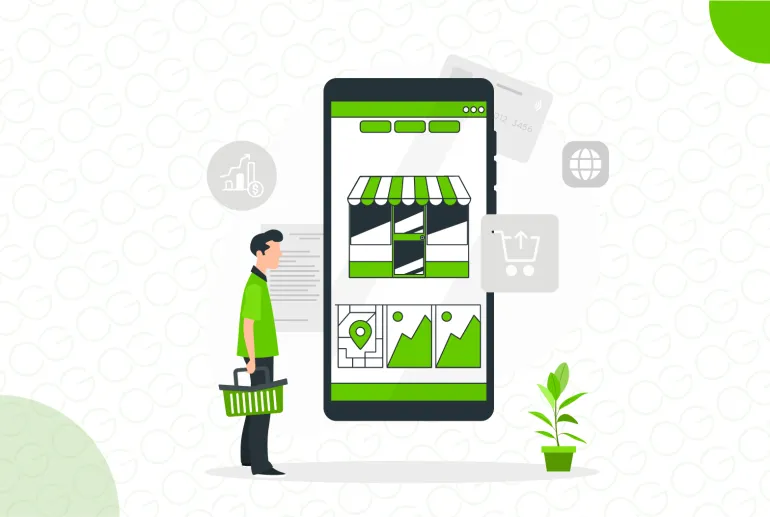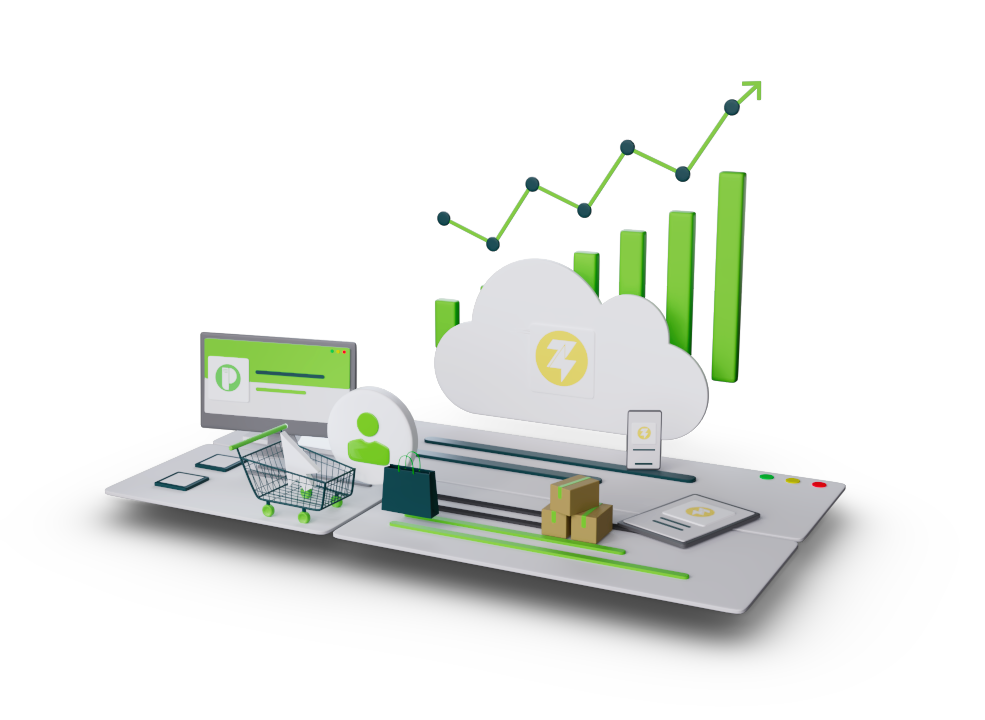Is there a point-of-sale solution for omnichannel retailers?

In today’s fast-paced, digital-first world, online shopping has become a key pillar of modern commerce, especially for younger generations like Gen Y and Gen Z. These customers, accustomed to the convenience and speed of online transactions, increasingly favour e-commerce due to its flexibility and ease of access. They can purchase products from the comfort of their homes and have them delivered directly to their doorsteps, avoiding the need for time-consuming visits to physical stores. This shift in consumer behaviour is pushing retailers, both large and small, to establish a presence in the digital space to stay competitive and relevant.
As businesses expand into the digital realm, it’s crucial for retailers to ensure a seamless, consistent shopping experience for their customers, regardless of whether they are shopping online, in-store, or through a combination of both. Merging offline and online sales into a unified system is not only critical but also complex. Omnichannel retailing is the strategy that enables businesses to offer a consistent and smooth shopping experience across multiple channels, but this demands robust technology infrastructure.
One essential element in supporting omnichannel retailing is a comprehensive retail point-of-sale (POS) solution. A modern POS system helps retailers manage and integrate both in-store and online sales operations seamlessly. When evaluating potential solutions, retailers need to ensure that their POS system includes a variety of key features that cater to the specific needs of omnichannel retailing.

Ensure your business thrives in the digital era with a robust omnichannel retail software
1. Integration with Omnichannel Enabler
The retail landscape is constantly evolving, and businesses need to keep pace with these changes to remain competitive. Omnichannel retailing is one of the most significant trends in today’s retail environment. For long-standing retailers, implementing omnichannel strategies may not have initially been part of their business roadmap. However, as customer expectations shift, the need for a unified experience across all sales channels—whether online, in-store, or via mobile—has become more pressing.
A modern POS solution should be capable of integrating with third-party eCommerce platforms and omnichannel retail enablers. This allows retailers to merge their online and offline operations effectively, providing a holistic view of sales, inventory, and customer interactions. Instead of investing in separate systems for in-store and online transactions, businesses should seek out a POS solution that accommodates integration possibilities with various applications, reducing costs and streamlining operations.
For new businesses just entering the retail space, it makes sense to invest in a POS system with built-in omnichannel capabilities. By starting with an integrated system from day one, they can create a unified customer experience across all channels, enabling them to scale smoothly as their business grows.
2. Real-Time Inventory Tracking
One of the most critical aspects of managing an omnichannel retail business is maintaining accurate, real-time inventory tracking. Customers today expect a frictionless shopping experience, whether they are browsing products online or visiting a physical store. To provide this seamless experience, retailers must ensure that their inventory counts are updated instantly across all channels.
For example, when a customer purchases a product at a store’s POS terminal or adds an item to their online shopping cart, the inventory levels should immediately reflect the change. Similarly, returns—whether they occur in-store or via an online platform—should also be accounted for in real-time.
A modern POS system with robust inventory management capabilities enables retailers to track their stock levels accurately across all locations and channels, preventing issues such as stock outs or overstocking. Some advanced systems even allow retailers to display product availability by location, enabling customers to see where specific items are in stock. This level of visibility enhances customer satisfaction and reduces the likelihood of lost sales.
Additionally, retailers who operate a combination of physical stores and e-commerce platforms can benefit from features like automatic reordering, low-stock alerts, and inventory forecasting, all of which can help streamline their supply chain operations and improve overall business efficiency.
3. Purchase Point Flexibility
Modern customers expect flexibility when it comes to how and where they make purchases. The ability to choose their preferred method of shopping is a key factor in enhancing customer satisfaction and driving loyalty.
A good POS system should offer customers multiple options for completing their purchases, including:
- Buy Online, Pick Up In-Store (BOPIS): Many customers prefer the convenience of purchasing online and picking up their items at a nearby store. This option eliminates the need to wait for shipping and allows customers to get their items quickly, often on the same day.
- In-Store Purchases with Delivery: Some customers prefer to shop in-store but would rather have their purchases delivered to their home, especially if they are buying bulky or heavy items.
- Cross-Channel Returns: The ability to return items purchased online to a physical store—or vice versa—adds another layer of convenience, fostering trust and loyalty.
By offering these options, retailers can meet the diverse needs of their customers and provide a seamless, omnichannel shopping experience. This flexibility also improves operational efficiency by enabling retailers to balance inventory levels across channels and reduce the burden of returns and exchanges.

Give your customers the flexibility they demand with a POS system designed for the future of retail.
4. Customer Loyalty Management
One of the key advantages of omnichannel retailing is the ability to enhance customer loyalty through personalised offers, rewards, and promotions. However, managing loyalty programs across multiple channels—whether online or in-store—can be challenging without a robust POS system.
A well-designed POS system should centralise all customer data and purchase history across channels, allowing retailers to customise loyalty rewards based on the customer’s overall interactions with the brand. For example, if a customer frequently shops both online and in-store, the POS system can compile this data to offer personalised discounts or special promotions based on their shopping behaviour.
Additionally, having access to detailed customer profiles enables retailers to create targeted marketing campaigns, offer VIP treatment to their best customers, and ensure that loyalty points and rewards are accurately tracked and redeemed, no matter where the purchase was made.
By effectively managing customer loyalty, retailers can increase repeat business, enhance customer satisfaction, and build long-lasting relationships with their shoppers.
5. Data Synchronisation Across Channels
In an omnichannel retail environment, data synchronisation is crucial. To make informed business decisions, retailers need access to accurate, up-to-date information from all their sales channels—whether it's online, in-store, or via mobile. This is where a modern POS system plays a pivotal role.
A good POS system gathers data from across all channels and consolidates it in a central location. This enables retailers to generate comprehensive reports that provide insights into sales performance, inventory levels, customer behaviour, and more.
With access to real-time data, retailers can:
- Analyse Sales Trends: By tracking sales across channels, retailers can identify which products are performing well and which ones may need to be discounted or phased out.
- Monitor Inventory Levels: A centralised inventory system allows retailers to see stock levels across all locations, ensuring that products are available when and where customers need them.
- Measure Customer Satisfaction: Data on customer interactions, returns, and feedback can help retailers assess customer satisfaction and make improvements to their services.
Furthermore, the ability to access separate data sets for each store location or sales channel provides greater flexibility for making location-specific decisions. Retailers can use this data to customise their marketing strategies, allocate resources more effectively, and optimise their overall operations.
6. Mobile POS (mPOS) Capabilities
As customer expectations continue to evolve, mobile POS (mPOS) systems are becoming increasingly popular among omnichannel retailers. With mPOS, sales associates can process transactions from anywhere in the store using a mobile device, such as a tablet or smartphone. This allows for a more personalised shopping experience, as staff can assist customers on the sales floor, answer questions, check inventory levels, and complete sales without requiring the customer to wait in line at a traditional checkout counter.
For omnichannel retailers, mPOS also provides the flexibility to expand into pop-up shops, trade shows, and other temporary retail spaces, without the need for a permanent, traditional POS setup. Additionally, mPOS systems often come with features that support integrated online and in-store transactions, making them a valuable tool for businesses looking to provide a truly omnichannel experience.

Switch to Ginesys POS and unlock the full potential of omnichannel retail
Finding the Right POS Solution for Omnichannel Retailing
In today’s rapidly changing retail environment, omnichannel strategies are no longer optional—they are a necessity for businesses looking to stay competitive and meet the demands of modern consumers. A robust, comprehensive POS solution is at the heart of successful omnichannel retailing, providing the tools and insights needed to manage inventory, sales, and customer interactions across multiple platforms.
When evaluating a POS system, retailers should look for key features such as integration with e-commerce platforms, real-time inventory tracking, purchase point flexibility, customer loyalty management, data synchronisation, and mPOS capabilities. By investing in a POS solution that supports omnichannel retailing, businesses can streamline their operations, enhance customer satisfaction, and make data-driven decisions that drive growth and profitability.
For retailers looking for a reliable and comprehensive POS solution, Ginesys offers one of the most advanced and trusted systems in the market. Tailored to meet the needs of omnichannel retailers, Ginesys POS provides powerful analytics, real-time data synchronisation, and seamless integration across platforms with the ERP and Order Management System, making it an ideal choice for businesses of all sizes.
Don’t let outdated systems hold your business back. Upgrade to an omnichannel-ready POS system today and take your retail operations to the next level. For more information, contact Ginesys now!
